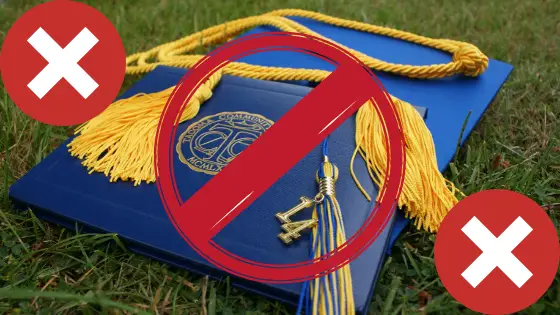Do you want to be a music teacher but you’re missing a degree?
Are you wanting to make some extra money teaching?
I’m asked this by young people looking to pick a career path and by adults looking for a new career path alike. They always ask:
Can you be a music teacher without a degree?
Whether you need a music degree depends on what type of music teaching job you’re looking for. In general, the answer is: no, you need a degree or the degree will help you a lot. However, there are ways to get around this and some types of music teaching don’t require a degree.
Look ahead for more information on what degrees you may need for different types of music teaching including private lessons, public school, private school, music clubs, and independent ensembles.
Table of Contents
Private Lessons Music Teacher
A private lessons or group lessons music teacher doesn’t need a degree to teach music.
Also called a studio teacher, these people host lessons out of their house, local music store, or space that they own/rent to teach students.
Depending on your target market and competition in the area, a degree may make the process of gathering students a whole lot easier.
If the competition is high, there will be other lesson teachers out there and several of them most likely have degrees. Students will be forced to pick between someone who doesn’t have a degree and someone else who does.
Most often, they will pick the person with the degree and experience. This won’t be the case every time, but you must be prepared to accept this.
You may be able to work around this problem in a few different ways. Here are some suggestions to look at and decide what’s right for you:
- Lower your price in relation to the “certified” teacher
- Be visible and perform in the community to establish your expertise through performance
- Encourage the students you have to spread the word about your lessons
- Market yourself at schools and music stores in the area
- Host free group classes for beginners on occasion
The other thing not having a degree may impact is what students you’re looking for. Elementary, middle school, and some casual high school or adult learners won’t care about your degree as much as your experience and personality.
However, for serious high school and college musicians, they will want a degree attached to you. This is for more than just skill.
Your “pedigree” will open doors for them in other areas as well. If these are the students you want, consider finishing a degree in music somewhere.
Public School Music Teacher
Public school music teachers come in many forms:
- General music
- Band
- Orchestra
- Choir
- Theory
- Guitar
- Piano lab
- Music history
- Music appreciation
All public school music teachers will need a degree in education. Most states require this degree also be specifically in music education.
Some states only require a degree in education with experience in music. Even the state with the music ed requirement will have programs to get certified in music without a whole other degree.
The specific certification requirement varies from state to state, so make sure to check your state’s department of education.
Private School Music Teacher
This one completely depends on the private school.
If the private school employs their music teacher through a nearby public school (a program called shared-time teaching), they will most likely need a degree.
However, depending on your state, many private schools are able to hire specialist classes without a finished degree.
Your chances of getting hired for one of these private school music teacher positions greatly increases with a degree, but many times these private schools are willing to look past this if you have a connection with the school and community.
Music Club Coach
Many schools have after-school music “clubs.” These can take many forms.
My high school didn’t have an official choir, but we did have a choir club. We met after school and our librarian was the director.
She didn’t have a degree, but the school was willing to work allow her to run the group because of her experience in choirs and in working with kids.
Do you need a degree to be a music teacher with these?
This is totally up to the school or governing body whether they allow you to teach without a degree. However, most are willing to let you do so if you have experience in music, have worked with kids before, and go through a background check.
Pro-tip: Volunteer with the school, especially in their music programs, to gain experience in working with kids and the endorsement of the school’s music teachers. This goes a long way.
Independent Ensembles
Another music teaching you may want to look at is as a community or youth music director. If the group is independent of the education system, the requirement for a degree is flexible.
Ultimately, it comes down to what the executive board of the group is looking for.
It’s also always possible to just start up a community or youth ensemble yourself. Often, this takes money and time, but there are plenty of people who start one with great success.
Since you’re the one who started it and in charge, you decide if you need a degree or not.
For help starting one, contact directors and leaders of community groups around you or in nearby areas to see what they had to do.
The Startup Symphony has some great resources. These are geared towards orchestras, but the concepts will apply to any music group.
Conclusion
I hope you find this information on if you can be a music teacher without a degree helpful. A degree makes some teaching fields possible and every field more accessible.
Consider going to finish the degree, but depending on what you want to teach in music, you may not need it.
What field of music teaching are you interested in? Let us know in the comments.

